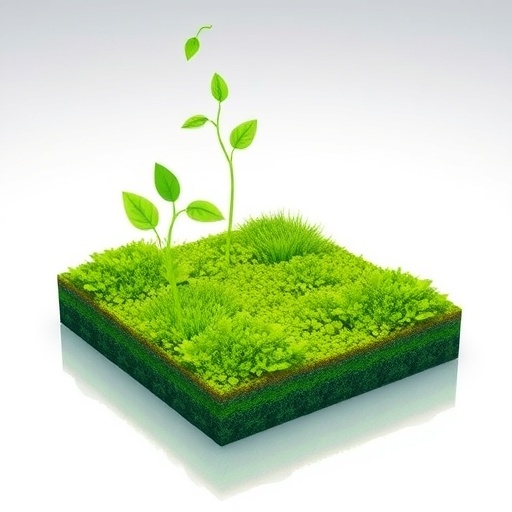In recent years, the intersection of biotechnology and ecological science has unveiled promising solutions for some of the most pressing environmental challenges facing our planet. Among these innovations, the synergy between microalgae and bacteria has emerged as a potent force in bio-electrochemical systems, particularly in their ability to facilitate nitrogen transformation. A groundbreaking study by Oon et al. sheds light on the complexity and efficacy of these biological interactions, revealing how they can significantly contribute to microbial dynamics and greenhouse gas mitigation.
Microalgae have been traditionally exploited for their exceptional capacity to convert sunlight, water, and carbon dioxide into biomass through photosynthesis. These organisms are not just passive players; they engage in intricate relationships with bacteria in their environment. This interaction can catalyze pivotal biochemical processes, particularly in bio-electrochemical systems, where electron transfer between microalgae and bacteria enhances nitrogen cycling. The study highlights how the mutualistic association leads to improved nitrogen transformation efficiency, which is critical in managing nitrification and denitrification processes that are fundamental to maintaining ecosystem health.
One of the primary motivations behind this research is the urgent need to address the ever-growing concerns surrounding nitrogen pollution, largely driven by agricultural runoff and fossil fuel combustion. Excess nitrogen in the environment can lead to eutrophication of water bodies, resulting in the formation of dead zones where aquatic life struggles to survive. By optimizing nitrogen transformation through microalgae-bacteria interactions, researchers aim to create sustainable solutions that not only mitigate such environmental threats but also harness useful biomass for various applications.
The research was conducted within the framework of photosynthetic bio-electrochemical systems, which cleverly utilize the natural processes of photosynthesis and microbial metabolism to generate energy. This system operates by facilitating the flow of electrons from photosynthetic microalgae to bacteria, thereby promoting the reduction and oxidation reactions necessary for effective nitrogen transformations. Through their study, Oon et al. provide evidence that such a setup enhances microbial dynamics, indicating a thriving community that thrives on the electron transfer facilitated by these interactions.
Furthermore, the study reveals that the efficiency of nitrogen transformation is not solely dependent on the presence of microalgae. Instead, it was observed that specific bacterial strains play a pivotal role in enhancing the overall process by utilizing the organic by-products generated by the algae. This dynamic collaboration between microalgae and varied bacterial communities underpins the success of these bio-electrochemical systems in promoting healthy ecosystems and reducing the release of greenhouse gases.
Researchers also explored the ramifications of this synergy in terms of greenhouse gas mitigation. The study articulates how bio-electrochemical systems that integrate microalgae-bacteria interactions can significantly reduce emissions of nitrogen oxides and methane, two potent climate pollutants that contribute to global warming. By enhancing nitrogen transformation processes, these systems provide a dual benefit: they mitigate harmful greenhouse gas emissions while simultaneously promoting nutrient cycling, thereby supporting agricultural sustainability and ecological balance.
In delving into the microbial dynamics within these systems, the study emphasizes the importance of biodiversity. A varied and rich microbial community not only enhances efficiency but also increases resilience against environmental stressors. This adaptability is crucial in a world where changing climate conditions can alter the effectiveness of biological systems. Therefore, fostering a diverse microbial community becomes an integral strategy for utilizing bio-electrochemical systems effectively in various environmental scenarios.
The impact of this study extends beyond theoretical implications; it presents practical pathways for enhancing agricultural practices and waste management. By leveraging the beneficial interactions between microalgae and bacteria, farmers could potentially create bio-fertilizers that optimize nitrogen availability while minimizing the adverse effects of synthetic fertilizers. This transition could result in healthier soils, reduced chemical runoff, and enhanced food security, especially in regions vulnerable to the impacts of climate change.
Moreover, the study’s findings underscore the necessity for interdisciplinary collaboration among scientists, policymakers, and agricultural practitioners. To fully realize the potential of microalgae-bacteria synergy in bio-electrochemical systems, concerted efforts are needed to translate these scientific insights into actionable policies and practices. Establishing partnerships between academic institutions and industries can pave the way for cultivating scalable solutions that address both environmental sustainability and economic viability.
In conclusion, the groundbreaking findings presented by Oon et al. exemplify the incredible potential inherent in the collaboration between microalgae and bacteria within bio-electrochemical systems. Not only do these systems support efficient nitrogen transformation, but they also play a critical role in mitigating greenhouse gases, contributing to a healthier planet. As research in this field continues to evolve, the insights gained from such studies will undoubtedly inform future environmental strategies and underscore the necessity of harnessing natural biological processes to combat climate change challenges effectively.
By fostering a deeper understanding of these microbial interactions, researchers are not only enhancing our knowledge of fundamental biological processes but also paving the way for innovative solutions that could transform agricultural practices and promote sustainability across diverse ecosystems. As we stand at the brink of an ecological crisis, studies like these offer a glimmer of hope, demonstrating that nature may hold the keys to sustainable solutions if only we learn to unlock its potential.
Subject of Research: Microalgae-bacteria synergy in nitrogen transformation.
Article Title: Microalgae-bacteria synergy in photosynthetic bio-electrochemical systems supports nitrogen transformation, microbial dynamics and greenhouse gas mitigation.
Article References: Oon, YS., Oon, YL., Ayaz, M. et al. Microalgae-bacteria synergy in photosynthetic bio-electrochemical systems supports nitrogen transformation, microbial dynamics and greenhouse gas mitigation. Commun Earth Environ 6, 884 (2025). https://doi.org/10.1038/s43247-025-02815-y
Image Credits: AI Generated
DOI: https://doi.org/10.1038/s43247-025-02815-y
Keywords: Microalgae, bacteria, nitrogen transformation, bio-electrochemical systems, greenhouse gas mitigation, microbial dynamics, sustainable agriculture, environmental sustainability.




